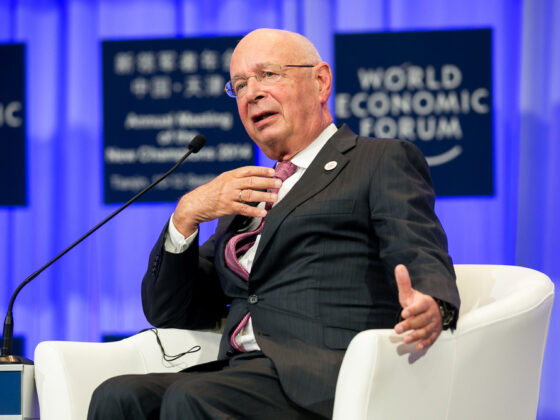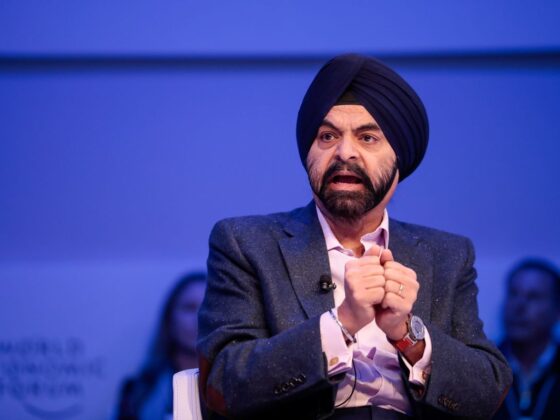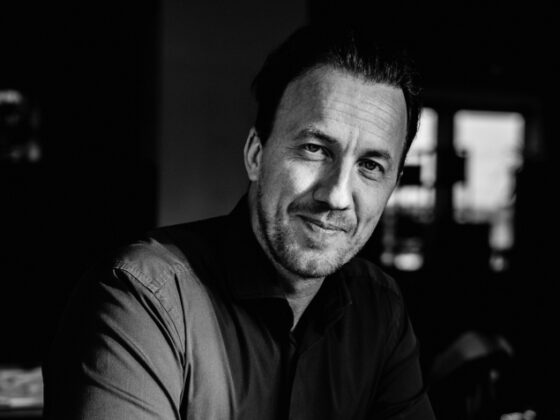The World Economic Forum organises its Global Shapers Community by means of hubs – there are more than 400 of these in some 150 different countries.
The idea is to give the impression of a worldwide youth movement, a groundswell of opinion from the new generation endorsing the WEF’s call for a Great Reset of our society and our lives.
But, of course, in reality the Global Shapers set-up is not a “community” at all, but a centralised structure in which young recruits are merely puppets, obedient mouthpieces for those actually running the show.
 The real agenda behind the Global Shapers is made very clear by looking at its leadership, as we did in our previous article.
The real agenda behind the Global Shapers is made very clear by looking at its leadership, as we did in our previous article.
The Shapers in all these hundreds of hubs are effectively working for the likes of WEF boss Klaus Schwab, Chinese Big Pharma billionaire Eric Tse and David Rubenstein of the war-profiteering CIA-linked Carlyle Group.
This is a world of “social impact investing”, of lucrative human and natural “capital”, a world of blockchain, robotics and AI, of equity funds and pharmaceutical businesses, a world of exponential profit and exploitation hidden behind a rhetoric of “inclusivity”, “sustainability” and “systemic change”.
Their agenda is nothing less than the acceleration of global corporate control to a level we can barely imagine, the imposition of a full-on techno-tyranny in which freedom is abolished for 99.99% of humanity and in which future generations are reduced the status of digitally-farmed cattle for the profit of the parasitical elite.
To illustrate this shocking reality, we here take a closer look at Shapers and their connections in some key global locations: London, Brussels, Silicon Valley, Beijing, Lagos and New Delhi.

LONDON
The London hub of the Global Shapers describes itself as a “large, vibrant and extremely diverse group” of young people who “care deeply about having an impact in London and the wider world”.
It is currently listed as being involved in four projects:
Shaping Fashion. “Now that the Coronavirus pandemic requires us to stay home and stay safe, Shaping Fashion and Fashion Revolution have joined forces for digital activation and empowerment of citizens”.
Covid Action in Europe. “This initiative provides WHO with an opportunity to gather information from Shapers on any rumours or potential misinformation that is circulating”.
United Against C19. “Stay at home. Help stop the spread of misinformation”.
Combat COVID. Stop misinformation. “Calling upon readers to share any rumours or potential misinformation they hear, the project endeavours to generate information for the WHO Europe to inform their communication around COVID-19”.
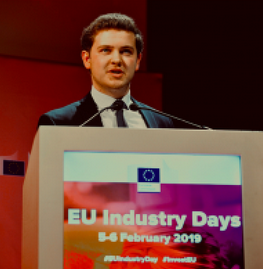 One of the rising stars among the 42 hub members is Rory Daniels.
One of the rising stars among the 42 hub members is Rory Daniels.
Daniels came to the public’s attention when he stood as Liberal Democrat candidate for Llanelli in the 2017 General Election while still a 19-year-old student.
Presented as “passionate about the EU“, he finished last of five candidates with a meagre 548 votes and even lost his deposit.
But a total lack of democratic mandate has not held him back. Daniels spoke at a UNESCO conference in Stockholm in 2019, where he was listed as “Young Leader of Industry, European Commission” and since September 2019 he has been a member of Amnesty International’s first Global Youth Task Force.

He has described Jeremy Corbyn’s warnings about the post-Brexit sell-off of the NHS as part of “Russian disinformation” and in November 2019 he attended a Council for Europe “World Forum for Democracy” event in Strasbourg entitled “Is Democracy in Danger in the Information Age?”.
In September 2020, Daniels was named as a new board member of the Sutton Trust, a charity set up by private equity tycoon Peter Lampl, who is described by Wikipedia as a “philanthropist“.
In 2020, the Sutton Trust was providing “briefings on the impact of COVID-19 on social mobility” concluding that “moving work experience and internships online can give a fairer opportunity to all and delivers benefits for employers too”.
The London hub’s founding curator Kate Hampton is chief executive of the Children’s Investment Fund Foundation, an “independent philanthropic organisation, with offices in Addis Ababa, Beijing, London, Nairobi and New Delhi”.
 CIFF claims it is all about “championing children”, working “with a range of partners seeking to transform the lives of children and adolescents in developing countries”.
CIFF claims it is all about “championing children”, working “with a range of partners seeking to transform the lives of children and adolescents in developing countries”.
But it also explains that it is “a private philanthropy focused on systemic change” seeking “integrated solutions that follow children along the life course”.
This is very clearly the social impact investing which Alison McDowell has been warning us about.
CIFF confirms this when it says it intends to be “nimble” and to “take risks where the potential pay-off is big”.
It adds: “We know that the returns on smart investments in areas such as children’s early development and adolescent girls are especially high”.
“Championing” children or exploiting them for profit, Ms Hampton?
 The CIFF exercise in so-called “smart philanthropy” was started in 2002 by hedge fund billionaire Chris Hohn and his then-wife Jamie Cooper.
The CIFF exercise in so-called “smart philanthropy” was started in 2002 by hedge fund billionaire Chris Hohn and his then-wife Jamie Cooper.
Hohn, given a knighthood by David Cameron’s Tory government in 2014, was revealed in 2019 as having donated £50,000 to Extinction Rebellion, with a further £150,000 handed over by Hampton’s CIFF.
At the same time it was reported that he had built a £630m stake in Heathrow Airport via a range of investment companies.
Hampton is not the only London hub member involved with the world of impact.
Vyonne Bajela, “previously a Senior Investment Manager at Mitsui & Co”, is today “the Founding Member and Principal at Impact X Capital, a UK based venture capital fund”.

Jasnam Sidhu works for PricewaterhouseCoopers, or pwc as it brands itself, a multinational professional services network famous for its Social Impact Lab and “founding partner of the Social Enterprise NL and Ashoka platforms”.

As we reported in Shapers of slaver: the leadership, Ashoka is a strange organisation, funded by “charitable foundations”, which links ultra-wealthy individuals such as Antonis Schwarz with “activists” like Rob Hopkins and also provides advice to organizations including the World Bank.
Sidhu’s “typical day” involves “mapping out disruptive technologies such as blockchain, AI, or drones”.

Kenny Imafidon is the co-founder and managing director of ClearView Research Ltd: “We specialise in gathering culturally-informed insights on diverse audiences, to inform business and marketing strategies, and to support social impact evaluation”.
His personal website reveals that “he was named by Impact Squared as one of 100 young leaders (under 25) across the globe making a social impact to transform our world”. He has mingled with royalty.

Jordan Abdi joined the London Global Shapers hub in June 2020.
In 2018, having graduated in medicine from Imperial College, London, he was picked out as a Schwarzman Scholar for the graduate fellowship at Schwarzman College, based at Tsinghua University in Beijing.
Abdi declared at the time: “China has a unique political and economic system, and in a world where China is posed to play a greater role, understanding its systems will be vital to successful multilateral engagement.
“My entrepreneurial background coupled with my interest in public policy makes this programme so appealing to me as its modules span business, policy and international relations at a time when greater global collaboration will be needed to solve our shared future challenges”.
Imperial College, whose modelling famously predicted a massive Covid death toll at the start of the “pandemic”, boasts in its report on Abdi’s scholarship that it has “strong connections with China” and is “the UK’s top academic research collaborator with China”.
Stephen A. Schwarzman, chairman of Schwarzman Scholars who funded Abdi’s time in China, is a former Lehman Brothers billionaire who co-founded global private equity firm Blackstone and is “a long-time friend” of Donald Trump.
 Abdi is very keen on the “automation of healthcare” and on old peole being looked after by robots.
Abdi is very keen on the “automation of healthcare” and on old peole being looked after by robots.
A “serial entrepreneur”, he is now “strategy and business development lead” for Singapore-based international business Holmusk, which is involved in “data driven medicine”, “behavioral health and neuroscience” and “innovation among pharma companies”.
Earlier in 202O, Abdi retweeted Boris Johnson when the UK Prime Minister declared “This is going to be a fantastic year for Britain” and Abdi later took to Twitter to announce: “2O21 is going to be great”.
But great for whom, precisely?
Hub member Faheem Ahmed is “a global impact investment advisor and ESG analyst, specialising in sustainable healthcare financing, delivery and innovation”.
In September 2020, he contributed an article to Forbes business magazine entitled “All Public Health Roads Lead To Private Equity”.
 Here he enthused: “Global healthcare is the fastest growing and most lucrative sector for private investors, closing over $100 billion worth of deals in 2019 alone”.
Here he enthused: “Global healthcare is the fastest growing and most lucrative sector for private investors, closing over $100 billion worth of deals in 2019 alone”.
He noted that “sustained government spending cuts to social care has [sic] presented lucrative opportunities for private equity worldwide”.
Are we alone in finding that statement totally abhorrent?
Ahmed concluded that “by shifting away from risky, average leverage ratios to impact-oriented patient growth capital, PE [Private Equity] can provide a much-needed lifeline to support the fragile health and social care systems we all depend on. In the end, all public health roads lead to private equity”.
A profile of Ahmed on the London Business School website notes that he has been appointed as a fellow of its Wheeler Institute for Business and Development, which “brings together business, government and NGOs for social impact”.
It adds that his “passion for social entrepreneurship” led him, in 2017, to co-found HealthMakeSpace.
HealthMakeSpace “aims to accelerate change across the NHS by connecting industry and entrepreneurs with clinicians to foster clinically guided innovation” and, it turns out, was “developed in partnership with Imperial College Health Partners”.
Imperial College again! What a coincidence that the London Global Shapers, whose projects are so focused on holding up the Covid pandemic narrative, are also linked to the insitutition whose projection helped fuel the panic!
 Bien King “is an experienced agile project management professional, community builder and youth leader with over 15 years of experience in enabling impact-driven organisations delivering multidisciplinary projects in the UK and across the globe”.
Bien King “is an experienced agile project management professional, community builder and youth leader with over 15 years of experience in enabling impact-driven organisations delivering multidisciplinary projects in the UK and across the globe”.
She was therefore presumably well over the current age limit of 27 when she joined the London hub in June 2020!
King is founder of Let’s Reinvent, which is interested in “reinventing value and opportunities” and aims to “take a robust collective action to generate awareness and opportunities to successfully onboard a full representation of the different segments of our society into the future of technology”.
She “can’t wait to get jabbed” with the Pfizer/BioNTech COVID-19 vaccine.

Claudine Adeyemu is a former “Rising Star” in the “We Are The City Awards” and number one in the 2018 EMpower/Financial Times Top 30 Ethnic Minority Future Leaders List.
She works for Mishcon de Reya, a law firm with offices in London and Singapore, which says it is “here to help our clients benefit from new economies, new geographic centres of wealth, the new global movement of people and capital, and the impact of new technologies and new knowledge”.
In 2018 it was accused by the family of the murdered Maltese anti-corruption journalist Daphne Caruana Galizia of harassment, intimidation and an attempt to “cripple” her financially.
 Hub member Laura Round is a Conservative Party activist and a former special adviser to the UK Defence Secretary and Secretary of State for International Development.
Hub member Laura Round is a Conservative Party activist and a former special adviser to the UK Defence Secretary and Secretary of State for International Development.
She is a councillor in the Royal Borough of Kensington and Chelsea and was one of the 2018 Tory candidates reportedly reprimanded by a pub manager for being obnoxious and allegedly plotting how to “spin” the Grenfell Tower tragedy when out canvassing.
Round is “associate director at the PR company freuds advising clients on purpose and social impact projects” and “a strong advocate of the role that the private sector can play in sustainable development”.
On January 4, 2021, she tweeted her delight that, with the UK’s involvement, India’s drug regulator had approved the AstraZeneca Covid vaccine.
Other London hub members include Dylan Itzikowitz, “venture associate” at Founders Factory (“we’re backed by the world’s most influential companies”) and Maxine Mackintosh, co-founder of One HealthTech.
Mackintosh’s research involves “routinely collected data from electronic health records”. She is “an advocate of digital health approaches and maintains that data analysis has the potential to transform traditional approaches to healthcare”.

You get the picture. Well-connected and wealthy young entrepreneurs obsessed with data gathering, private equity, venture capital and social impact investment.
Just a typical cross-section of London youth!
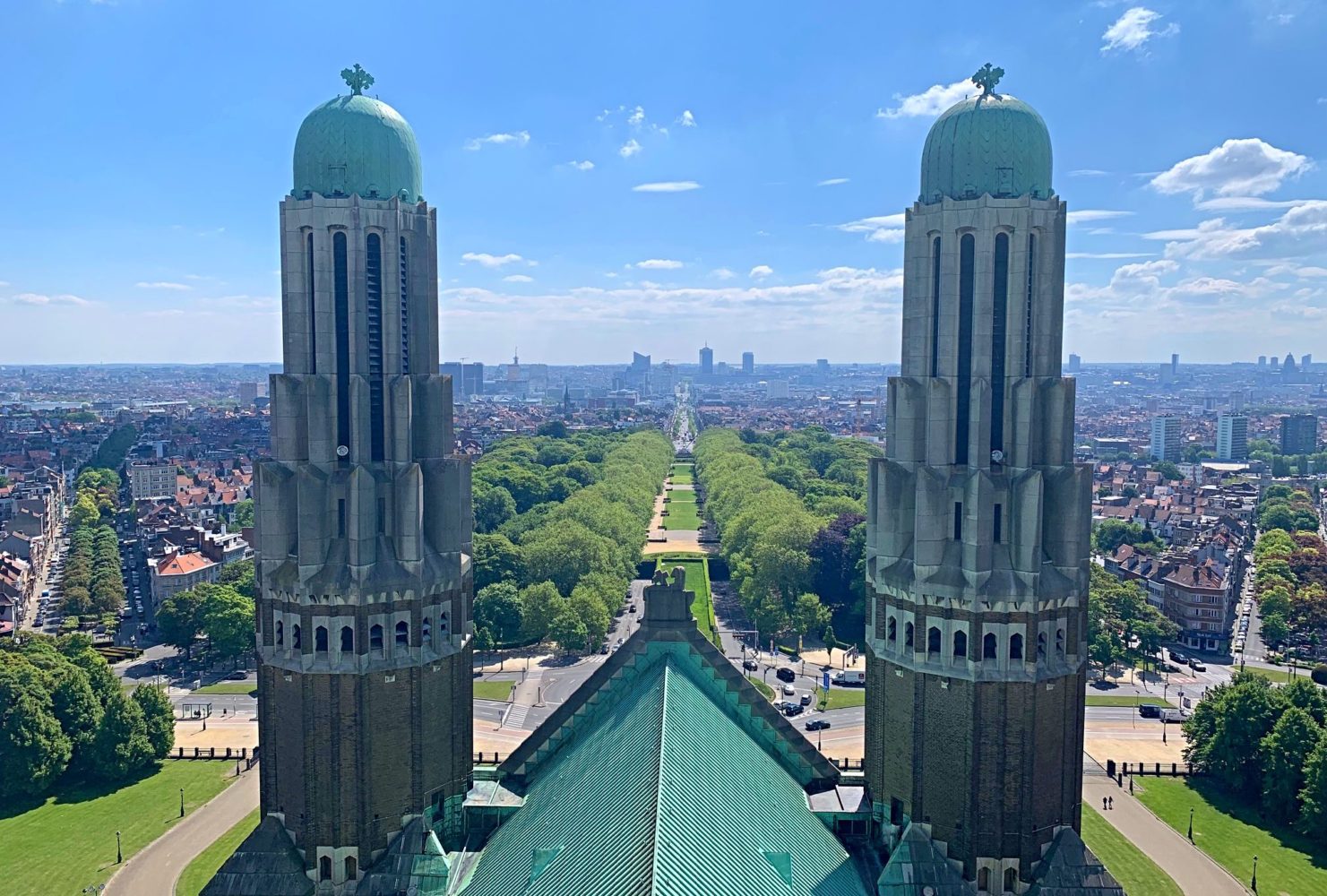
According to the city’s Global Shapers, “Brussels is where frontiers become foundations of inclusive projects, the capital where Belgium’s diversity meets into a nation; the heart of the European Union”.
They add: “Brussels best embodies the notion of thinking global and acting local, as it is home to the grand vision that underpins the European project and of challenges facing communities at a neighbourhood level”.
The hub is listed as currently being involved in four projects:
Museum of the Future. “Companies and institutions must be able to anticipate the changes of the Fourth Industrial Revolution and adapt quickly, and cities and communities must be able to do the same. Whether its [sic] understanding the impact of virtual reality, artificial intelligence, big data or the Internet of Things, Shapers want to enable all actors to play an active role in shaping the future of Brussels”.
The Future of Work. “One-third of our lives is spent in a work environment that is being rapidly transformed by emerging technologies. Global Shapers have the opportunity and the responsibility to influence the Future of Work”.
Brussels Happiness Project. “Provides the framework in which people are able to share their progress and get peer advice, encouragement, and support”.
Vote! “A project dedicated to improving awareness, debate, and ultimately youth voter turnout and engagement for the next European Parliament elections”.

One of the key figures in the 31-strong hub is former curator David Timis.
His personal website describes him as “a keynote speaker focused on the impact AI will have on the future of work” and notes that he “has guest lectured at renowned universities, such as Cambridge University in the UK and the College of Europe, and delivered presentations for a diverse range of clients, including Google, the European Commission, and AIESEC”.
Timis is interested in “human capital” and in 2018 was “a Project Manager at Google, where he coordinates the most ambitious digital skills training program in Romania, Atelierul Digital”. This project also taught young people “entrepreneurship”.
In 2017 he became “a social innovator at Ashoka” – the strange organisation we mentioned in relation to London’s Jasnam Sidhu and also in Shapers of slavery: the leadership.

Timis is also co-founder and project manager of European Heroes, which is part of the Future of Europe initiative (“New narrative for Europe: Bringing more Union into the European Union”) funded by the European Commission’s Europe for Citizens Programme.

Fellow hub member Nadine Khouzam is involved in attempts to format young children’s brains for the requirements of the coming techno-tyranny. Her CodeNPlay business “trains computational thinking — the ‘thought process of machines’ — through robotics in a playful way to kids aged 6 and older”.
Explains one report: “In classes of maximum 12 students starting as early as 6 years old, CodeNPlay teaches the logic of programming through robots and coding as game”.
CodeNPlay’s partners are Digital Belgium, perspective.brussels (the Brussels Planning Agency) and Google.

Oana Popescu works in “Business Acceleration Services” at the European Innovation Council. This Euro-body was “introduced by the European Commission to support the commercialization of high-risk, high-impact technologies in the European Union”.
 It works to promote “a European Green Deal” and “a Europe fit for the digital age”.
It works to promote “a European Green Deal” and “a Europe fit for the digital age”.
It is concerned that “Europe’s venture capital market remains underdeveloped” and aims “to put Europe on top of the next wave of breakthrough and disruptive innovation that creates new markets, in particular by combining physical and digital products and services based on new technologies business models”.
The project is, of course, all about channelling public money into businesses developing “future and emerging technologies”.
“The EIC Accelerator will enable higher levels of support to target cases where risks are too high for private investors and which have innovative scale up potential”.
Sabina Ciofu is head of EU and trade policy at techUK, which works at “championing technology’s role in preparing and empowering the UK for what comes next, delivering a better future for people, society, the economy and the planet”.
It lists its “partners” as The Broadband Stakeholder Group, The Cyber Growth Partnership, DigitalEurope, European Cloud Scout, Tech Partnership Degrees and UK Spectrum Policy Forum.

Ciofu’s firm aims to “make the UK good for tech” and “ensure the UK is the best place for technology companies to locate and thrive”.
It is interested in “accelerating innovation” and sets out to “explore the applications of emerging technologies and champion their use. From cloud and 5G to artificial intelligence and quantum, we analyse the significance and opportunity of new tech and identify how they fit into the thriving UK tech ecosystem”.
It says it “works with businesses and stakeholders to develop effective policy and regulatory solutions to promote the digitisation of the economy and drive productivity and inclusive growth” and adds that “techUK believes technology has the power to strengthen society and we work with the government and stakeholders to build a smarter state”.
Ciofu previously spent nearly ten years as a policy advisor in the European Parliament, focusing on tech-related legislation, international trade and EU-US relations.
Alarmingly, she “holds an MA in War Studies from King’s College London”.
 Uğur Can Hekim is an international trade lawyer and vice-president of the Paris-based law association Jus Gentium, which says it promotes “internationalism, globalism and human rights” and supports Black Lives Matter.
Uğur Can Hekim is an international trade lawyer and vice-president of the Paris-based law association Jus Gentium, which says it promotes “internationalism, globalism and human rights” and supports Black Lives Matter.
Jus Gentium explains on its website that it “provides a platform for our network to develop legal, intellectual, and political influence. The principal objective of Jus Gentium is to educate and train young changemakers, diplomats, economists, government staff and international lawyers”.
 The Brussels hub’s founding curator is Koen Hoornaert, a partner in the corporate law practice at Van Olmen & Wynant.
The Brussels hub’s founding curator is Koen Hoornaert, a partner in the corporate law practice at Van Olmen & Wynant.
He is said to be a specialist in “cross-border mergers and acquisitions and private equity”.
Antonella Vagliente is co-founder and director of Young Water Solutions – “empowering young social entrepreneurs to kick-start their own water and sanitation solutions”.
 Her organisation says it wants to “make an effective and scalable contribution to the Sustainable Development Goals” by “empowering young leaders and entrepreneurs, providing them the tools to carry out water and sanitation projects and launch social businesses in their communities”.
Her organisation says it wants to “make an effective and scalable contribution to the Sustainable Development Goals” by “empowering young leaders and entrepreneurs, providing them the tools to carry out water and sanitation projects and launch social businesses in their communities”.
Youssef Kobo is an “entrepreneur and strategic innovation consultant” and former advisor to the Brussels Secretary of Digitalization.
He is the founder and managing director of several projects claimed to be “empowering vulnerable communities in Europe, Africa and the Middle East”, including one set-up called A Seat at The Table.

Kobo says: “We want to inspire young people and show them how ambitious they can be themselves and thus create their opportunities”.
The context for this statement is that it appears on the website of Brussels’ Impact House, where “social entrepreneurs, supporting organizations, impact investors, inclusive corporates and civil society come together”.

Organisations featured as involved include Impact Capital (“impact focussed ecosystem”), Oya Seed (“be disruptive and change the system”), SI2 Fund (“deploying human and financial capital”), Shaerpa (“provides management services to impact investment funds”), Klimaatzaak (“force the Belgian authorities to fulfil their climate promises”), C2C Platform (“guides companies towards Cradle to Cradle (C2C) certification”) and, of course, the ubiquitous Ashoka, with its mission “to identify, connect and support these changemakers to accelerate social innovation and trigger systemic change”.
Triggering systemic change into a 21st century slavery system, some might say…

The Palo Alto hub of the Global Shapers describes itself as “a group of dreamers and doers from diverse professional and cultural backgrounds who seek to make a difference through advocacy, initiatives and projects”.
It adds: “Located in the heart of Silicon Valley, the Hub strives to capitalize on its unique location by gathering highly accomplished young individuals to address regional and global challenges in a world where youth are central to solution building, policy-making and lasting impact”.
The hub is only linked to one project on the Global Shapers site, namely Technology to Decrease Inequality. “Palo Alto is a major center for many of the innovations associated with the Fourth Industrial Revolution, whether artificial intelligence, big data analytics, mobile-based lifestyle tracking, 3D printing and nanotechnology. Yet a communication gap exists between the leaders engineering these technologies and the populations that they impact”, they write.
“Only through inclusive dialogue will Palo Alto be able to shape the Fourth Industrial Revolution and create a future that reflects the city’s and citizens’ common goals”.

There are 18 listed members of the Palo Alto hub.
Paul Klimos is a leading figure. Indeed, since October 2020, he has even been promoted to the WEF’s Global Future Council on Agile Governance.
Klimos is an attorney with global law firm DLA Piper, which boasts that its clients include more than half of the Fortune 250 rich list, that it advises “governments and public sector bodies”, has a longstanding partnership with UNICEF, is a signatory of the United Nations Global Compact and “strives to be a leader in environmental sustainability”.
In 2012 it was the twelfth-largest donor to President Barack Obama’s re-election campaign.
In his work with DLA Piper’s Corporate practice, Klimos “helps founders navigate the challenges of entrepreneurship and emerging technologies” and advises on matters such as “private investment fund formation and operation, as well as domestic and cross-border mergers and acquisitions”.

Klimos has worked for the Federal Reserve Bank of New York and at the Central Bank of Lebanon as well as “at international financial institutions and regional law firms in Central America and the MENA region” and has contributed to a United Nations Development Programme “peace building project”.
He is “passionate about empowering youth, shaping public policy, and redefining opportunities in the midst of the 4th Industrial Revolution”.
Andrea Carafa is a an “entrepreneur, design thinker and educator” who has worked for the European Commission on “managing emerging technologies for social and economic impact” and with the European Organization for Nuclear Research (CERN), where he “identified technological trajectories and suggested ways to accelerate the emergence of new technologies that can positively impact society”.
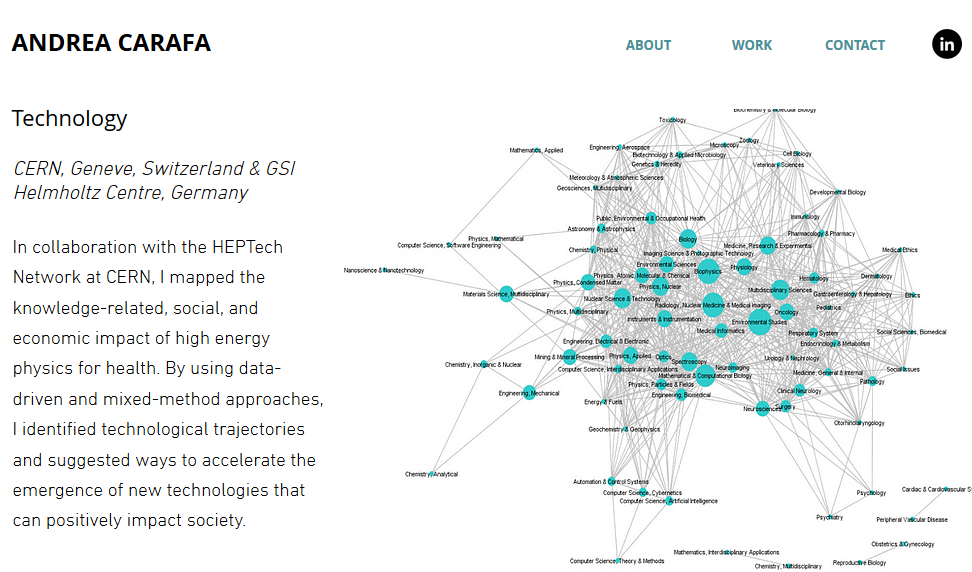
 Carafa is an “entrepreneur in residence” with global private equity firm Blackstone (see also the London hub report, above), where his work is to “seed and incubate new technology ventures”.
Carafa is an “entrepreneur in residence” with global private equity firm Blackstone (see also the London hub report, above), where his work is to “seed and incubate new technology ventures”.
He “chaired the Impact Entrepreneurship Initiative at President Obama’s Global Entrepreneurship Summit and advocated the establishment of the Sustainable Development Goals at the United Nations”.
 Karishma Jadega is a “bioengineer”, a “budding entrepreneur” and medical account manager at Health Tap, “the leader in providing access to high-quality virtual primary healthcare to all. For individuals & organizations”.
Karishma Jadega is a “bioengineer”, a “budding entrepreneur” and medical account manager at Health Tap, “the leader in providing access to high-quality virtual primary healthcare to all. For individuals & organizations”.
Their “personalized AI-powered symptom checker” is, HealthTap tells employers, “a modern approach to keeping workers healthy”.
A lot cheaper than providing them with access to real healthcare, that’s for sure.
David Capelli is a tech entrepreneur, the founder of TECH Miami and involved for many years in “blazing the trail to equitable smart cities“.
Describing her work with Capelli in 2016, fellow Smart Cities specialist Carla Mays said: “Our current research includes strategies around revenue models for building and sustaining smart city infrastructure vs. just cost savings and modernization efforts”.
 She said their work involved encouraging “strategic partnerships to support digital public infrastructure for smart cities, in relation to increased automation and leaning of the global labor force”.
She said their work involved encouraging “strategic partnerships to support digital public infrastructure for smart cities, in relation to increased automation and leaning of the global labor force”.
“Topics include cybersecurity, new business and revenue models development for public sector organizations, access to capital to build new markets, diversity and inclusion in entrepreneurship to support new market growth, disruption and innovation of community and economic development, uses of AI, blockchain in fintech and smart contracts in public sector enterprise cloud and mobile.
“We are almost 17 years into the 21st century, and we must innovate and invest in a ‘New Deal’ that helps Americans compete in the innovation economy and thrive and live in diverse smart cities”.
A clever way to push smart cities is to pretend that they are in some way “green”, although, like the Fourth Industrial Revolution in general, their world of digital “connectivity” involves an acceleration of industrialism and power generation and also, therefore, of environmental destruction.

Capelli and Mays are now working together on the #SmartCohort Program, “the #1 comprehensive program for Smart & Sustainable Cities Development”.
In this 2017 article they complain that “the public sector currently heavily relies on corporate sustainability and philanthropic dollars to fund Smart Cities development” and insist that “public administration must lead in establishing equitable frameworks for Smart Cities development, design and implementation”.
Palo Alto hub member Jimmy Au works for cloud computing business Salesforce, one of the Global Shapers’ official partners, headed by billionaire Marc Benioff, owner of Time magazine and inaugural chair of the WEF’s Forum Center for the Fourth Industrial Revolution in San Francisco.
In this Salesforce video, Au’s voice-over explains that he is a senior product manager of the Einstein AI “prediction builder” team. His slideshow tells us: “Intelligent automation will drive the next level of productivity”.


Au is also a mentor with FoundersHK, or 港創人, an organisation set up to connect the “tech community” in Silicon Valley and Hong Kong.
It says its mission is “to build Hong Kong as the next tech hub of the world” and it sees itself as “an entryway for Hong Kong founders to Silicon Valley and the rest of the world”.
Au’s fellow mentors at 港創人 include Frances Lam, senior product marketing manager at Microsoft and Edith Yeung, general partner at venture capital firm Race Capital (“we invest in what matters to humanity”).
Another mentor is Cindy Chow, executive director of Alibaba Hong Kong Entrepreneurs Fund.
Alibaba founder Jack Ma was listed, as we saw in Shaping slavery: the leadership, on the Foundation Board of the Global Shapers Community.

The Beijing hub of the Global Shapers announces that it consists of a “large and diverse group of young people, including investors, entreprenuers, artists, doctors, and corporate managers” who are “engaged in such industries as tech, Internet, healthcare, education, art, and many more”.
There are three projects associated with the hub on the Global Shapers website:
Shaping Fashion. “This is a great time to call for a sustainable fashion industry after Covid-19. Now that the Coronavirus pandemic requires us to stay home and stay safe, Shaping Fashion and Fashion Revolution have joined forces for digital activation and empowerment of citizens”.
Shapers Connect: Promoting COVID-19 Global Solidarity. “Schools across the world are forced to close and switch to online teaching due to the global pandemic… Reimagine education in the post-COVID-19 world”.
WeStillHaveArt2020. “A global online art movement that encourages people to create daily art and bring inspiration to each other in the tough time of the COVID-19 epidemic”.
 The message is very consistent there. Because of the “epidemic”, everything we do in life now has to be done online!
The message is very consistent there. Because of the “epidemic”, everything we do in life now has to be done online!
Hub curator Liu Ruoxi is currently “working on reducing the gap among social entrepreneurs, government officials and venture capital investors” and explains that the project involves “several social enterprises which leverage blockchain and big data technologies to solve social credit problems”.
She is employed as an adviser at Tau Investment Management, a New York and Hong Kong-based growth-equity venture investment firm.
Tau is headed by Munich-educated Oliver Niedermaier, who is also on the boards of international technology-led services and payments specialist EQ (Equiniti Group plc) and of the World Policy Institute, which until 1982 went under the splendid name of the Institute for World Order.

In 2014 the firm invested $200 million in the textiles sector in Bangladesh, the sum being a portion of a billion-dollar Tau Transformation Fund “seeking to change the global supply chain over next three years as part of their Clinton Global Initiative to upgrade the apparel and textile supply chain in promising garmenting destinations such as Bangladesh and the likes”.
Tau adds on the “opportunity” section of its website: “As e-commerce has become pervasive in global apparel markets, consumers are emphasizing availability and fast delivery of a wide range of apparel products. It is now imperative for global apparel brands to identify rapidly evolving fashion trends and ensure that they capture the market by supplying the right apparel to their customers both quickly and with high quality”.
Call us cynical if you will, but could there just possibly be a link there with the Beijing hub’s involvement in the “Shaping Fashion” project?

Beijing hub member Chen Xiaohan was one of three young Chinese Shapers invited to the WEF’s Davos conference in January 2017.
 In an interview on the WEF site, she enthused about the advantages of social media by declaring: “A Chinese university student can have the latest breaking news at his fingertips from Weibo and initiate a conference call on WeChat to discuss a West African social innovation project with his partner, whom he met in a LinkedIn group”.
In an interview on the WEF site, she enthused about the advantages of social media by declaring: “A Chinese university student can have the latest breaking news at his fingertips from Weibo and initiate a conference call on WeChat to discuss a West African social innovation project with his partner, whom he met in a LinkedIn group”.
Chen works as associate director of public affairs at Schwarzman College, Tsinghua University, which hosts international Schwarzman Scholars, such as London Global Shaper and Imperial College graduate Jordan Abdi (see above).
The college and scholarship are named after Stephen A. Schwarzman, the former Lehman Brothers billionaire who co-founded global private equity firm Blackstone, which employs Andrea Carafa of the Palo Alto hub (see above).
Beijing hub member Shaoqian “Steve” Deng also works at Tsinghua University, where he specialises in “machine learning, industry data analytics, and computer architecture”.
He is in charge of “designing machine learning algorithms and hardware architectures for the MATRIX blockchain” and is due to speak at the Blockchain Expo at the Business Design Centre in London in September 2021.
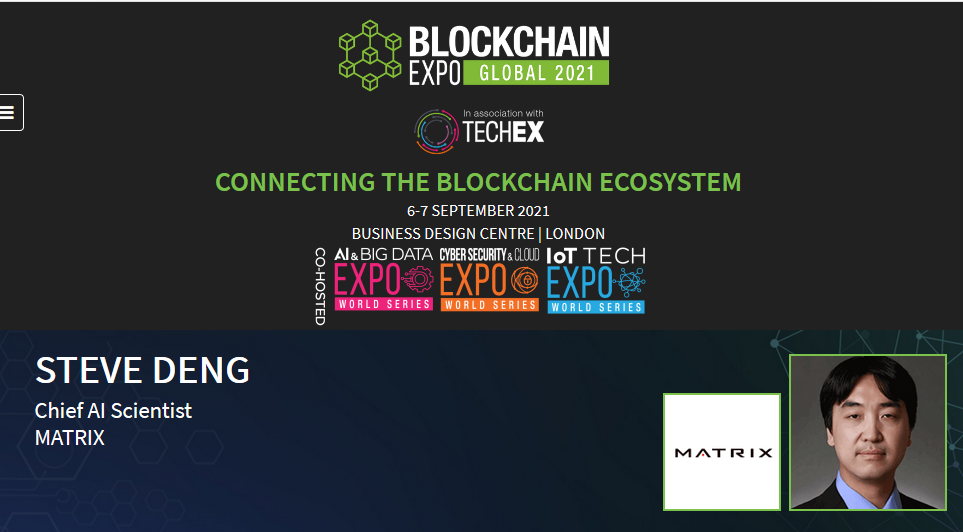
So what is his project all about? A 2018 article on the Matrix AI Network website sheds some light.
It states that “AI’s progress has been throttled by its own technical challenges. A nagging economic paradox continues to feed skepticism around transformative technologies”.
The problem, apparently, is that “there is a still a major disconnect for productivity in the real economy” and technological advance has not proved sufficiently profitable.
“The growth rate for labor productivity in the US steadily fell to less than half its rate in 2005”.

The Matrix AI Network article reveals that Deng and his team have discovered “ways that AI could make breakthrough advances in areas hindering the growth of blockchain”, such as slow transaction speeds, cyber security risks and “zero value creation from scarce computing resources”.
It adds: “Blockchain’s promise to serve as the backbone of all other technologies has spurred a wave of aspiration to restructure entire sectors of the economy by integrating blockchain with tech applications like AI and Internet of Things (IoT).
“While governments, enterprises and big banks remain apprehensive about blockchain’s swift growth, first movers are convinced that this innovation is not the next cloud — It’s the next internet”.

Beijing Hub member Dai Wei is the founder and chief executive officer of the bike-sharing company ofo, which runs its schemes via a smartphone app.
 It was all going very well for a while, but a report in the South China Morning Post on December 27 2020 says that ultimately Ofo’s “cash-burning tactics failed to pay off”.
It was all going very well for a while, but a report in the South China Morning Post on December 27 2020 says that ultimately Ofo’s “cash-burning tactics failed to pay off”.
According to MSN news on December 28 2020, Ofo is in “bad financial shape and earlier this year abandoned its bike-sharing interface and transformed itself into a shopping app”.
The writing had been on the wall. Forbes reported back in December 2018 that Dai had been “blacklisted by a Beijing court for not meeting his debt obligations”.
Ofo has received backing from Alibaba, the business empire of Jack Ma, the Chinese billionaire who has recently disappeared from sight – and indeed from the Global Shapers’ online version of their Foundation Board (see Shapers of slavery: the leadership).
 The highest profile Beijing hub member is Eric Tse, who seems to have replaced Ma as China’s representative at global leadership level.
The highest profile Beijing hub member is Eric Tse, who seems to have replaced Ma as China’s representative at global leadership level.
Although the young Big Pharma billionaire is from Hong Kong, he is said to have “close ties” with “mainland Chinese politicians”.
His father Tse Ping was previously a committee member of the Chinese People’s Political Consultative Conference (CPPCC), the country’s top political advisory body.
CNN report that on October 1 2019, the 70th anniversary of the founding of the People’s Republic of China, “the younger Tse attended Beijing celebrations open only to invited guests and dignitaries”.
On December 7, 2020, Tse’s Sino Biopharmaceutical invested $515 million in Sinovac, the company behind the CoronaVac vaccine.
 CoronaVac has already been declared “safe” in Brazil and over a million doses had arrived in the Latin American country by the start of December.
CoronaVac has already been declared “safe” in Brazil and over a million doses had arrived in the Latin American country by the start of December.
Says this report: “On Monday, December 7, Indonesian President Joko Widodo said that Indonesia received 1.2 million doses of CoronaVac, in preparation for potentially distributing the vaccine in Indonesia early next year. Indonesia is also set to receive another 1.8 million CoronaVac doses in January”.
Sino Pharmaceutical’s investment “is expected to fund further development, capacity, expansion and production of CoronaVac in exchange for further equity stakes”.
Sinovac said the new stream of funding would help the company double its manufacturing capacity to produce over 600 million doses of CoronaVac per year.
In reaction to the news of its massive vaccine investment, shares in Global Shaper Tse’s Sino Pharmaceutical “jumped 4.93 percent“.

Africa is a key target of the 2020s corporate exploitation agenda.
As Cory Morningstar wrote in her October 2020 article ‘The Enclosure of Africa‘, “the race to recolonize African citizens, as techlonial subjects, has begun”.
Lagos, in Nigeria, is the most populous city in Africa and is a major financial centre for the whole of the continent.
We should therefore not be too surprised by the revelation on the Global Shapers website that “the Lagos Hub was one of the first Global Shapers Hubs created”.
It says that its 37 members are “dynamic young leaders drawn from business, non-profit, private, public service, across major sectors of the Nigerian economy” who are “committed to positively impacting our community”.
The Lagos hub is involved in four projects:
Shaping Fashion. See Beijing, above.
Covid-19 Dialogue Series. “We invite medical experts, especially experts involved in managing the pandemic in the country, to help educate people and give clarity on the myths currently circulating on social media”.
Covid-19 Relief Lagos. “The COVID-19 pandemic has had a devastating effect on the livelihoods of some of the poorest in the population”.
COVID-19: Global Situation and Strategic Direction. “A major difference of the current pandemic compared to pandemics in the past is the widespread misinformation through different sources. The goal of the process was for intellectual support and a collaboration with a think tank named Centre of Progress and Inclusive Development (CPID) was an impressive result”.
Lagos hub curator is April Amorighoye, a “corporate communications and strategic brand management specialist”.
 In a 2019 video she appears sporting a Global Shapers t-shirt, “championing” the WEF’s ‘Shaping My City’s Future’ project (see Shapers of slavery: the plan).
In a 2019 video she appears sporting a Global Shapers t-shirt, “championing” the WEF’s ‘Shaping My City’s Future’ project (see Shapers of slavery: the plan).
Amorighoye says that “achieving a sustainable city and community in Lagos sounds like such a Herculean task” but that she is promoting “accessible designs of the future by the Fourth Industrial Revolution”.
She says that she is standing in a place where “a lot of people lost their lives due to bad buildings and bad structures”.
The hub curator says she has learned from the WEF’s ‘New Champion Awards‘, which honour “companies exploring business models, technologies and sustainable growth strategies that will be needed in the Fourth Industrial Revolution”.
“I plan to give back to the community”, she concludes, by trying to “shape this city’s future”.
It sounds very much like Amorighoye and the WEF would like to see the old parts of Lagos rased to the ground to make way for a “sustainable” smart city, a digital prison of total control and surveillance in which Nigerians would be reduced to the condition of “human capital” for the global corporate slavemasters.
Amorighoye also set out her agenda in a June 2020 article on the WEF website.
She writes: “The COVID-19 pandemic is revolutionizing digital and online education globally but kids in rural and underserved communities in Lagos State, Nigeria, are being left behind as they are not equipped to adapt or transition to the new methods of learning”.
This is the famous “digital divide”, a fake-humanitarian storytelling term by which the megalomaniac technocrats want to force Africa and the whole world online (in the name of “inclusivity”) and thus subject to their control and exploitation.
Amorighoye is worried that there may be “a severely diminishing pool of young adults who have not garnered the necessary skills to stay ahead in the future”.
She adds: “With Nigeria already behind in preparing its young people for the workplace of the future, the effects of the pandemic further exacerbate this issue.
“There are measures that must be taken to help bridge the divide when the urgent needs of the pandemic subside. They centre largely around Public-Private Partnerships (PPPs) and government aid”.
She writes: “Government aid is needed in terms of investing in educational tools of the future alongside a total revamp of the educational sector.
“Reforms in the national curriculum post-pandemic would be an effective way to bridge the gap in inequality.
“Priorities should include the introduction of courses such as coding and robotics which can usher students into the era of the Fourth Industrial Revolution and prepare them for jobs of the future”.

Amorighoye’s article recommends the Teach for Nigeria project, which declares on its website: “Millions of children in Nigeria lack access to an excellent education that will give them a successful future.
 “This results in more and more people continuing to join the cycle of poverty, making it increasingly difficult for our nation to live up to its vision of a better future. Teach For Nigeria exists to change this narrative”.
“This results in more and more people continuing to join the cycle of poverty, making it increasingly difficult for our nation to live up to its vision of a better future. Teach For Nigeria exists to change this narrative”.
The real “vision” behind Teach for Nigeria is revealed by its “partners”, which include:
Aluko & Oyebode. A law firm “noted for its work in banking and finance”.
Africapractice. “A strategic advisory firm, operating at the nexus of industry and government”.
ExxonMobil. US oil giant “well positioned for future’s evolving energy landscape”.
FBNQuest. “The unified brand name for the Merchant Banking and Asset Management businesses of FBN Holdings Plc, one of the strongest and most dependable financial service groups in sub-Saharan Africa”.
pwc. PricewaterhouseCoopers, a multinational professional services network famous for its Social Impact Lab (see London, above).
Grace Lake Partners. An investment and advisory firm which “builds and operates profitable businesses that address important societal needs in Nigeria while creating economic value for GLP and its shareholders”.
Sterling Bank. “A full service national commercial bank in Nigeria”.
Swift. “The global provider of secure financial messaging services”.
Verod Capital Management. A leading West-African private equity investor “backed by a rich blend of mainly foreign and institutional investors”.
Amorighoye’s plan to “give back to the community” of Lagos evidently means making them more “productive” for global finance.
As she writes: “Aid provided in this direction can be viewed as an investment in human capital”.
Founding curator of the Lagos hub is Osayi Alile. She works as a consultant to Nigeria’s Access Bank, which since 2019 has been “the largest bank in Africa” and which enjoyed “a breakout growth in earnings” in the third quarter of 2020.
 Alile is also CEO of Aspire Coronation Trust (ACT) Foundation, which is, in fact, supported by Access Bank.
Alile is also CEO of Aspire Coronation Trust (ACT) Foundation, which is, in fact, supported by Access Bank.
ACT announces on its site: “Our mission to drive sustainable impact across Africa pushes us beyond boundaries”.
ACT expresses concern at the direction Africa has been taking in recent years.
It states: “As the rates of unemployment and underemployment continue to soar all over the continent, the value of human capital, as well as the pace of development begins to plunge.
“Today, some extreme political and religious organizations have taken advantage of the situation which may gradually become difficult to contain.
“Sustainable solutions are therefore urgently required to counter the challenge of unemployment in Africa.
“We believe that entrepreneurship is key to driving growth in most developed economies; hence, our support is extensively directed towards the youth population who sit at the heart of innovation.
“By instilling entrepreneurial values in the minds of young people, we intend to drive sustainable socio-economic impact in African communities”.
In another article, Alile’s organisation complains that “the poor development of the continent is unimpressive when juxtaposed with its vast potentials in rich human and natural resources”.
In order to make better use of that human and natural capital, ACT is “committed to revitalizing leadership in Africa”.
It explains that its call for new “leadership” is shared by the New Partnership for Africa’s Development (NEPAD).

Launched 20 years ago, NEPAD is interested in “accelerating economic co-operation and integration among African countries” and has partnerships with international development finance institutions — including the World Bank, G8, European Commission, UNECA and others — and with the private sector.
Its ongoing projects include:
* The launching of a ‘green revolution’ in Africa.
* Numerous trans-boundary infrastructure projects and the launch of a Pan African Infrastructure Development Fund.
* An “e-schools programme” in partnership with several large IT companies.
In June 2015 NEPAD was involved in special session at the World Economic Forum Africa with the Tony Blair Africa Governance Initiative (see Shapers of slavery: the leadership).
And it has the enthusiastic backing of Blair’s friend Tony O. Elumelu, one of the Global Shaper leaders.

For instance, the Nigerian billionaire said in 2017: “A coherent and coordinated approach is needed to mobilize institutional investors while limiting their risk exposure.
“African governments need to work on creating conducive environments to attract these investments which are so vital for the continent’s growth and development.”
Hub member Temitope Adediran is a software developer at Andela, a US business with operational campuses in several locations in Africa.
Its co-founder and CEO Jeremy Johnson previously co-founded 2U (“we power world-class online higher education”).
 Andela describes itself as a “global talent network that helps companies build remote engineering teams” and Johnson was delighted to note in September 2020 that “Covid-19 has dramatically accelerated the trend toward remote work”.
Andela describes itself as a “global talent network that helps companies build remote engineering teams” and Johnson was delighted to note in September 2020 that “Covid-19 has dramatically accelerated the trend toward remote work”.
According to Andela, “an accelerated shift to permanent remote work allows engineering leaders to rethink their staffing strategies, tapping more global resources, which can increase productivity and cultural diversity”.
Its site reveals: “Andela is backed by investors including Generation Investment Management, Chan Zuckerberg Initiative, Spark Capital, and Google Ventures”.
Lagos hub member Sinmisola Nojimu-Yusuf has been interviewed by the DevelopAfrika site ( the page is tagged “African Youths” and “Youths Making Impact”).
She said: “Nigeria as we all know is what you would call a developing nation. The painful thing however is the very slow process in which this development is happening. There’s little or no progress and we are moving at a snail speed. I feel responsible for creating the future that I want”.
The Future We Want. Nice bit of WEF branding!
Nojimu-Yusuf continues: “I believe the world is going beyond formal education yet we still place all our value on it. There’s a need to equip youths with the soft skills needed to thrive in the future of work”.
Future of Work. Another one. Well done!
Looking back at 2018 on her personal website, she writes: “I got accepted to the World Economic Forum Global Shapers Lagos Hub! With this platform, I’m taking a step forward on my journey to being a nation and continent builder on a global scale.
“Still linked to the above I was offered a the [sic] role of strategy and structure lead at a fantastic NGO called Project Zeros focused on poverty alleviation and of course I accepted it with open arms”.
 It seems the NGO is actually called Project Zero and is “deployed to tackle the menace of out-of-school children by supporting and re-enrolling children who are out of school or on the verge of dropping out of school”.
It seems the NGO is actually called Project Zero and is “deployed to tackle the menace of out-of-school children by supporting and re-enrolling children who are out of school or on the verge of dropping out of school”.
“The initiative, in partnership with Lagos State Universal Basic Education Board (LASUBEB), is deployed to trace, mobilize and support children who have dropped out of school due to socioeconomic impacts of COVID-19 pandemic”.
Another report explains that this “social remedial project” also involves “some private partners”.
We learn that in July 2020 LASUBEB “commenced a 10-day digital literacy training programme facilitated by Microsoft in partnership with ATB Technosoft Solutions for over 12,000 Primary School Teachers”.
The report continues: “While emphasising the importance of technology to learning, the LASUBEB Chairman stated that its relevance has become more pronounced with the outbreak of the Coronavirus pandemic which has changed the ways of doing things globally”.

The New Delhi hub describes itself as “one of the earliest Global Shapers Community Hubs in India” which “has garnered an interesting profile of Shapers and undertaken myriad initiatives”.
It says it works with “individual and institutional sector specialists and impact driven local organizations”.
It describes the Global Shapers Community as “a network of young people” and insists its activities in India “focus on larger public good”.
The hub is currently linked with eight projects.
Magic Collar Initiative for Street Animals. “1,100 collars will be put on dogs and cattle”.
Smart Mobility. “Regulate the flow of traffic through smart technologies and sensors”.
Upskilling for Girls from Marginalized Communities. “Projects towards maximum possible impact”.
COVID-19 in South Asia. “The fight against this virus is seen on every level; from a global scale to local municipalities”.
Indigenous Masks – Covid, Climate & Art. “A hybrid project framework that lies at the intersection of pandemic response, arts and climate & biodiversity conservation by functioning on the multi-stakeholder theory”.
COVID-19: Global Situation and Strategic Direction. “A major difference of the current pandemic compared to pandemics in the past is the widespread misinformation through different sources”.
COVID-19 Resources in Regional Languages. “Crucial myth-busters and more”.
Virtual Community Huddle & Webinar Series. “Discussing the impact on big business and understanding the post-COVID-19 world”.

There are 32 listed members of the New Delhi hub, one of whom is Utkarsh Amitab.
Amitab is the founder of Network Capital, variously described as “a peer-to-peer mentoring community” and “a remote-first company”, which has “organically grown to become a global tribe of 100,000+ mentors from 104 countries”.
We learn from his profile: “Being passionate about public–private partnerships, Utkarsh shaped Network Capital’s partnership with Government of India’s Atal Innovation Mission to build India’s largest mentoring program”.
This scheme was set up “to create and encourage an environment of innovation and entrepreneurship across schools, educational organisations, research institutes and industries”.
Among its key initiatives are Atal Incubation Centres, focused on supporting “technological innovation” in areas including artificial intelligence, Internet of Things and cyber-security.
 It is also developing Atal Tinkering Labs, described as “learning spaces for students between Class 6 to 12 for them to develop skills and become adept at new technologies such as artificial design (AI), design and computational thinking, adaptive learning, etc.
It is also developing Atal Tinkering Labs, described as “learning spaces for students between Class 6 to 12 for them to develop skills and become adept at new technologies such as artificial design (AI), design and computational thinking, adaptive learning, etc.
“The modules have been created by partners such as Microsoft, Adobe, SAP Labs, Wipro, and other such leading tech-based companies”.
Amitabh is also known as “the torchbearer of Ashoka University’s Young India Fellowship”.
Readers will recall that Ashoka is a strange organisation funded by “charitable foundations”.
And there is something very strange and cult-like about the language and imagery featured in the current recruitment brochure for the “flagship residential postgraduate diploma in liberal studies”.

 “A Fellow for Life”, it declares. “The Fellowship Never Ends”.
“A Fellow for Life”, it declares. “The Fellowship Never Ends”.
“Adapting to the new normal will require an empathetic, collaborative and interdisciplinary approach to problem solving and leadership.
“Young India Fellows together form a community of diverse leaders and changemakers from all walks of life, driven to generate transformational impact on society. Members of the community continue to demonstrate a spirit of service towards the Fellowship and Ashoka”.
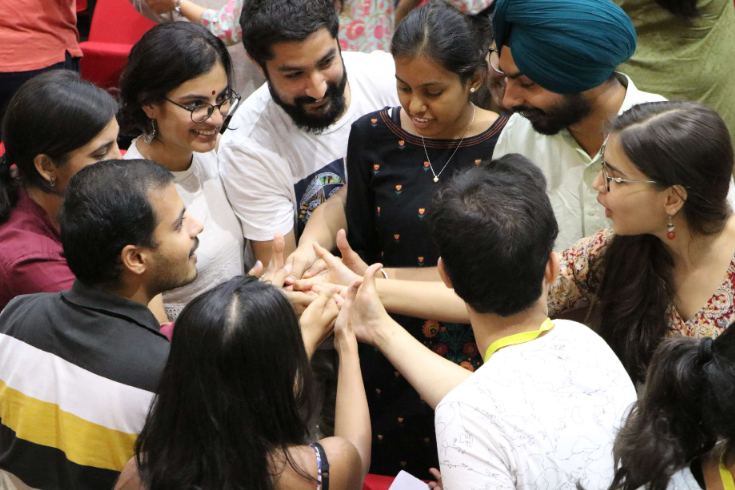
The brochure reveals that “since 2011, the YIF has groomed over 1700 socially conscious leaders and change-makers for the 21st century”.
The use of the word “groomed” is interesting, there.
One of the “post-fellowship pathways” presented by the scheme for which Amitabh bears the torch is headed “Create Social Impact”.
The brochure suggests that young Indian people interested in “creating meaningful change in society” might like “apply to the values-driven 18-month Mother Teresa Fellowship programme at Ashoka University’s Centre for Social Impact and Philanthropy”.

Bonus fact about Amitabh: “He previously worked at Microsoft and helped build India’s first smart village“.
 New Delhi hub curator Mitali Nikore describes herself as a “feminist economist examining infrastructure, gender & structural barriers”.
New Delhi hub curator Mitali Nikore describes herself as a “feminist economist examining infrastructure, gender & structural barriers”.
She is the founder of Nikore Associates, “a youth-led policy and research group aiming at policy efficacy and design”.
Nikore herself is totally on board with Klaus Schwab’s Great Reset agenda.
She insists, for example: “Smart infrastructure is essential to lay the foundation for the fourth industrial revolution in developing countries.
“It is time for governments and private sector to work together, so that underserved populations can leapfrog to their new normal”.

She has also written an article for The Times of India which “highlights the need to increase the investment in the digital infrastructure and analyses India’s readiness to transition to 5G and suggests a 4-point action plan to achieve the $1 trillion digital economy”.
In September, Nikore participated in the WEF’s Sustainable Development Impact Summit 2020 (“Putting the world back on a path of sustainable, equitable, and inclusive growth will require more than a global recovery; it will require a Great Reset of social and economic systems”).
In a video presentation she explains that she is currently advising the Asian Development Bank on a plan to “improve the competitiveness and efficiency” of Indian businesses.
She is also “advising the World Bank on transport and logistics” and exploring how to “reduce the logistics costs in a country as large and wide as India”.
With this in mind, she explains that the aim of her “think tank”, Nikore Associates, “is to work on gender and infrastructure together and see how we can actually work with industries, private sector, and convince them to make the investments that are required to bring women into workplaces”.

Nikore Associates’ interest in gender issues is reflected in the fact that its team “spent a large part of 2019” compiling a chapter for a book called The Indian Woman’s Journey: The Last Five Decades.
Their chapter “analyses women’s participation in the Indian economy since its independence”.
And its title? “Women’s Human Capital”.
Nikore is also an advisor for the BRICS Chamber of Commerce.
This international organisation, covering the so-called BRICS states (Brazil, Russia, India, China and South Africa), uses the marketing slogan “gearing up for the future”.
It states that it is “determined to change the system” and is “working hard to bridge the gap between the worlds of education and business”.
Its chairman, Vishwas Tripathi, kicks off his ‘message‘ to readers of the website by talking about praying for “peace in the cosmos”.
But his organisation seems to think that this will best be achieved by working with the arms trade!
The BRICS CCI Aerospace & Defence & Homeland Security team boasts “decades of defense-specific consulting experience” and provides “comprehensive business, technical, manufacturing and project solutions to clients for the Ministry of Defense, Front Line Commands and the supply chain”.
It describes itself as “a single-window platform/voice to promote the best interests of the Industry”.

Hub member Sonakshi Chaudhry is also interested in what Nikore Associates term “Women’s Human Capital”.
In a June 2020 article on the Outlook India site, she expresses concern that “women are dropping out of the country’s workforce at an alarming rate” and adds that “despite an increase in education and training, estimates suggest that in 2020, only 15 percent of India’s youth entering the labour force will be female”.
Chaudhry complains that this is happening despite the fact that “Indian girls and women are more educated than ever”.
She asks: “If this is not translating into jobs in the ‘real’ world, what is the purpose of education in India then?”
She muses: “For those of us with the privilege to believe it, education may be an end unto itself, but…”
But what exactly? In fact, unbelievable though it may seem, Global Shaper Chaudhry is arguing that education for India’s girls and women is a bad thing!
Indeed, the article in question is entitled ‘Is Education The Reason Women Are Disappearing From India’s Workforce?’

Chaudhry puts the blame on “mismatches between aspirations, skills, and availability”.
She explains: “Improved literacy rates across the country have led to an exponential increase in qualified potential female workers.
“Despite this growth opportunity, however, there has not been an equivalent increase in the available white collar jobs because job creation has been largely in the informal sector.
“Thus, while India’s women are becoming more educated, they are not always able to find jobs that are commensurate with their educational qualifications.
“Dr. Deshpande sums it up succinctly with an example, saying, ‘A girl who has completed class 10 or class 12 may not want to be a manual worker…’”.
 Chaudhry says that, instead of being educated in the way we currently understand it, young people should be trained with “the necessary skills for 21st century jobs”.
Chaudhry says that, instead of being educated in the way we currently understand it, young people should be trained with “the necessary skills for 21st century jobs”.
This would obviously be good news for the businesses hoping to exploit their labour for profit and whose agenda dictates the sly narratives spun by the likes of Chaudhry.
Indeed, she references her leaders’ position in her article, writing: “A World Economic Forum project suggests that closing the nation’s skills gap could add US$1.97 trillion to India’s GDP by 2028.
“Thus, the economic implications of India’s youth being unprepared for the modern job market make updating education and adding skilling programmes an urgent need”.
Chaudhry is also research and editorial lead at the Women In Labour Podcast.
Its “about” page says it is “a podcast on women and work. With laughs”.
It goes on to express the same concerns as those voiced by Chaudhry in her Outlook India article.
“Since 2005, the percentage of Indian women in paid work has dropped from 35% to less than 24%, but no one is talking about why. Until we did, and Women in Labour was born (pun intended).
“A comedic take on a serious issue, Women In Labour explores a veritable feast of topics related to women, work, family, power, and everything in between. Why do Indian women do the most unpaid work in the world? Why do we preface our work emails with ‘I was just wondering…’? Why do we still watch movies that stereotype women’s roles? And the big one—what’s keeping us away from India’s workplaces?”
A section tucked away at the bottom of the page, entitled ‘A big thanks’, states: “We are grateful to an awesome team of passionate women at the American Center in New Delhi who have supported our vision and made this possible. But, here’s the legal bit, the views of our podcast do not necessarily represent the views of the American Center or the U.S. Government”.
“Not necessarily”!

The New Delhi hub’s founding curator is Neeraj Bharadwaj, a man with considerable experience in the global corporate realm.
He graduated from The Wharton School of the University of Pennsylvania, in the USA, and received an MBA from Harvard Business School.
He has previously held senior roles at The Goldman Sachs Group (an American multinational investment bank and financial services company), McKinsey & Co (an American worldwide management consulting firm) and Morgan Stanley Dean Witter & Co (another American multinational investment bank and financial services company).
Bharadwaj was managing director at tech firm Accel India and partner at private equity investment group Apax Partners.
He is currently a director of Confluent Software, a $4.5 billion-valued Silicon Valley cloud computing company started by Jay Kreps, co-founder of LinkedIn.
 Bharadwaj is also a director of New Delhi’s Global Health Pvt Ltd, which deals in “diagnostic, rehabilitation, and other hospital services”.
Bharadwaj is also a director of New Delhi’s Global Health Pvt Ltd, which deals in “diagnostic, rehabilitation, and other hospital services”.
He is a “non-independent non-executive” director of Mumbai-based SeQuent Scientific Ltd, “an integrated pharmaceutical company with a global footprint” which aims to “create value in the global animal health space”.
Managing director Manish Gupta says that although it already has a healthy annual turnover of $165m, the firm is “well poised to a new phase of development” in which it could become “one of the top global animal healthcare companies”.
The reason for this optimism? SeQuent has a “new promoter group” and is now backed by a big concern which is “no stranger to the Indian Healthcare sector”, has “a deep understanding of the market and an ability to create value” and for whom the SeQuent transaction was “their largest control deal in India”.
 The identity of this new business backer? Why, it’s none other than the Carlyle Group which, as we saw in Shapers of the slavery: the leadership, was identified in 2003 as being “at the epicenter of the military-industrial-complex-Bush-Cheney-crony-capitalism administration” and is heavily involved in the arms industry.
The identity of this new business backer? Why, it’s none other than the Carlyle Group which, as we saw in Shapers of the slavery: the leadership, was identified in 2003 as being “at the epicenter of the military-industrial-complex-Bush-Cheney-crony-capitalism administration” and is heavily involved in the arms industry.
David M. Rubenstein, a CIA-linked American billionaire who is part of the Global Shapers leadership, is co-founder and co-chief executive officer of the Carlyle Group.
And who is the managing director of Carlyle India Advisors Private Limited, handling “growth capital and buyout opportunities across sectors in India”?
It’s Neeraj Bharadwaj, founding curator of the Global Shapers New Delhi hub, that “network of young people” famous across all India for its “focus on larger public good”.

Our next report focuses on the Global Shapers and Covid-19.




